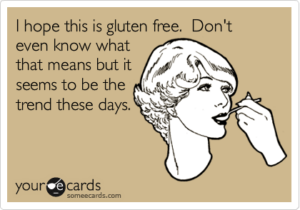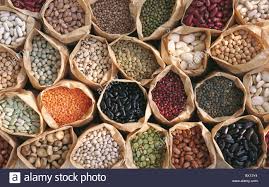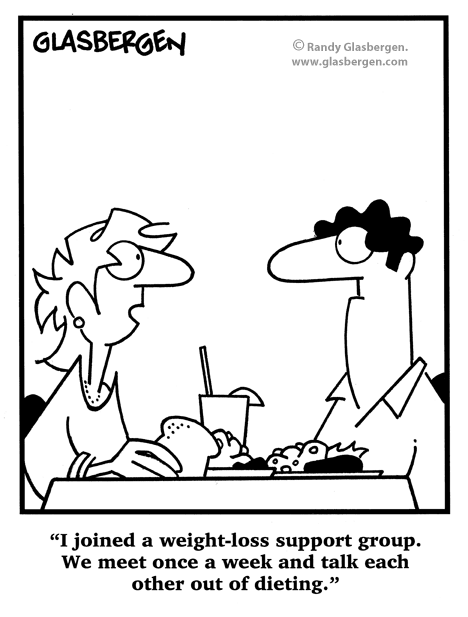Heart-healthy diet headlines: Should you cut the carbs?
By Karen Collins
Questions about carbohydrates – total amounts and particular food choices — seemed to be top-of-mind for many people when I was speaking about a heart-healthy diet at recent conferences.
Studies suggesting new approaches to weight manage ment and heart disease prevention are making headlines. And patients are asking challenging questions to health professionals who care for them. Unfortunately, sometimes these headlines distract attention away from eating choices that research continues to identify as health-protective.
ment and heart disease prevention are making headlines. And patients are asking challenging questions to health professionals who care for them. Unfortunately, sometimes these headlines distract attention away from eating choices that research continues to identify as health-protective.

Karen Collins
I’ve most recently been talking about nutrition in the headlines to several multi-disciplinary audiences of health professionals. Focused on heart health, they were eager for help putting headlines in context of overall research.
When speaking to professionals from cardiac rehab programs at the American Association of Cardiovascular and Pulmonary Rehabilitation (AAVPR) annual meeting, my topic was, “Nutrition News in Review: Clearing Through Headline Hype to Focus on Key Messages for Healthy Eating Strategies”.
Shortly thereafter, I was back on the podium in Nashville speaking at the National Lipid Association (NLA) Fall Clinical Lipid Update addressing, “Talking to Your Patients about Trending Diets”.
In both presentations, I emphasized the need to support nutrition choices that are grounded in good science, while addressing people’s questions and concerns about headlines they see.
Are Certain Carbohydrates Unhealthy?
Some books and blogs have garnered attention with claims that it’s best to avoid broad categories of foods, such as gluten-containing foods, wheat in particular, or pulses (dried beans, peas and lentils). The rationale for such diets generally involves claims that these foods can promo te inflammation or insulin resistance, or that they contain anti-nutrients that decrease our ability to absorb some nutrients.
te inflammation or insulin resistance, or that they contain anti-nutrients that decrease our ability to absorb some nutrients.
I previously addressed concerns about compounds called phytates and lectins for readers of the American Institute for Cancer Research blog. The big picture of overall research does not show harm from phytates when wheat is included as part of healthful eating habits. If anything, they may benefit antioxidant and anti-inflammatory defenses. Although compounds called lectins are high in uncooked grains and dried beans, proper cooking makes content negligible.
Rather than being pro-inflammatory, long-term population studies link whole grains with lower risk of heart disease. Studies show protection with three modest servings daily, and it grows even stronger with more substantial amounts.
Dried beans, peas and lentils offer potential for a variety of health benefits. They seem to provide prebiotic support for a health-promoting gut microbiota and help reduce LDL cholesterol. And their combination of protein and fiber may promote satiety, thus helping weight management.
Carb Choices that Make Sense
Some people do have an intolerance to certain grains or pulses, but a blanket assumption that gluten, grains or beans is at fault can lead you to omit foods that could be supporting health.
For the average U.S. adult to meet amounts of dietary fiber recommended for lower cancer risk, for example, means boosting fiber by 13 grams a day. Here, I discussed how that’s achievable, with one or two fiber-containing foods like vegetables, whole grains and beans swapped for less healthy foods at each meal. For more on why a variety of foods with fiber is the best strategy, check my AICR post. (For health professionals, I covered fiber in the diet in more depth here for Today’s Dietitian.)
Chronic low-grade inflammation and insulin resistance are serious concerns for heart health and overall health, too. For most people, eating habits associated with lower levels of inflammatory markers include a variety of relatively unprocessed plant foods. That’s vegetables, fruits, whole grains, pulses and nuts.
Unhealthy weight gain is tied to inflammation and insulin resistance. If you, like many adults, have pounds creeping up, look for realistic changes that can bring a modest weight loss. Take the focus off the search for a particular food as the sole problem or solution.
Are Low-Carb Diets Best To Lose Weight?
This was a hot topic at both of the cardiovascular conferences where I was presenting early this fall.
In carefully controlled research trials, low-carbohydrate diets average one or two pounds greater weight loss than low-fat diets at 3 to 6 months, but no difference at 12 months. Weight loss is generally more strongly related to how closely someone sticks to a diet than to whether the diet reduces calories by restricting carbohydrate or fat.
This highlights the need to identify changes that are most realistic for each individual.
In the DIETFITS trial published earlier this year, subjects were assigned to interventions targeting amounts of either carbohydrate or fat as low as each individual considered sustainable long-term. After one year, both groups had cut about 500 calories a day, with no difference in average weight loss. The only differences were that LDL (“bad”) cholesterol levels dropped in the low-fat group, whereas they increased slightly in the low-carbohydrate group. (That’s not really a surprise since the group cutting carbs increased the saturated fat they were eating.) And blood triglycerides (another heart disease concern) dropped in both groups. This is as expected since levels tend to decrease with weight loss. But the drop was substantially more in the low-carbohydrate group.

What About Carbohydrates & Heart Disease Prevention?
An international study called the PURE study has made headlines linking high-carbohydrate diets with increased mortality rates. But the study draws heavily on poor and middle-income countries in Asia. In many of these populations, a high-carbohydrate diet is often based primarily on white rice, with poor nutrient intake, poverty, and limited access to medical care. No surprise that carbohydrate is linked with poor health outcomes in that setting.
Conclusions are quite different when viewed in context of the ARIC study, which is based in the U.S. In this study, diets very low and very high in carbohydrate are both linked with greater heart disease deaths. Much more than a simplified answer about “carbs”, this study showed again what has been seen in past studies: health effects depend on food choices that make up our eating habits.
- Low-carbohydrate diets are linked to worse health outcomes when less carbohydrate means more animal sources of protein and fat.
- High-carbohydrate diets are linked with worse health outcomes when carbohydrate comes mainly from refined carbohydrate (like sweets, refined grains, and sugar-sweetened drinks), without much fat or protein from plant sources (such as pulses, whole grains, nuts and healthful oils).
When we talk about health and changes in carbohydrate, fat or protein, it’s vital that we talk about the food choices that achieve those changes.
What about ketogenic diets?
One analysis pulled together 13 studies comparing diets low enough in carbohydrate to be ketogenic versus low-fat diets. After a year or more, ketogenic diets resulted in 2 pounds greater weight loss. That was “statistically significant”, but is a two-pound difference clinically significant for effects on health? Regardless of the effects on weight, ketogenic diets overall resulted in a greater decrease in blood triglycerides, but an increase in LDL (“bad”) cholesterol compared to low-fat diets.
This increase in LDL cholesterol with a low-carbohydrate, high-fat diet has also been reported in a study published since these presentations that involved only normal weight, young adults. LDL response varied widely, suggesting that if someone wants to try a low-carbohydrate approach to eating, it’s important to monitor effects on blood lipids like LDL. If ketogenic diets are reduced in calories to promote weight loss, or saturated fat is low (less than 8% of calories), they might not necessarily raise LDL levels.
A 2-year trial in people with type 2 diabetes used diets that reduced calories and also kept saturated fat low (no more than 10% of calories). One group of subjects did this with a ketogenic version of the diet, another with a version higher in carbohydrate but low in glycemic index (meaning the carbohydrates weren’t coming from sweets and refined grains). At one year and at two years, both diets achieved similar decreases in weight, blood pressure, A1C (a marker of blood sugar control in these people with diabetes), and LDL cholesterol. The ketogenic diet, however, achieved this with fewer diabetes medications and less glycemic variability throughout the day (which researchers suggest may lead to better long-term outcomes).
It’s great that more than one style of eating pattern may bring health benefits. But don’t underestimate the challenges to people who don’t have a research team supporting them as they try to implement an eating pattern like the one in this study. The more limits put on food choices, the harder it is to continue long-term in a realistically enjoyable lifestyle.
What Makes a Heart-Healthy Food Choice?
Interest in potential benefits of low-carbohydrate diets has stemmed from headlines suggesting that reducing saturated fat may not protect against heart disease as claimed. Putting those headlines in perspective, however, we can see that when studies compared all people with higher and lower amounts of saturated fat in their diets without considering their food choices, that’s when no benefit was seen for limiting saturated fat. Conclusion: swapping ice cream and fatty meat for fat-free cookies, sugar-laden soft drinks, and giant refined grain bagels doesn’t help.
Choices research most clearly supports:
- Low in saturated fat if… Studies that consider the healthfulness of what people eat when they reduce saturated fat show that people are less likely to develop heart disease when they replace foods high in saturated fat with more whole grains and unsaturated fats (from nuts, avocados, fish and healthful oils, for example).
- Plant-focused if… A plant-based diet is often recommended as a heart-healthy eating pattern that also helps lower cancer risk and promotes overall health. But when plant food choices emphasize sweets and refined grains, the risk of heart disease increases. In contrast, when a plant-focused diet emphasized vegetables, fruits, whole grains, dried beans, nuts and healthful oils, heart disease risk was reduced by 25% compared to people who ate lowest amounts of these foods.
- Calories supporting a healthy weight… In a study of adults with risk factors for heart disease, decreases in blood cholesterol, a marker of inflammation (CRP), and insulin levels at 12 months were unrelated to whether the diet focused on cutting carbohydrate, fat or calories. Changes in these risk factors were significantly related to weight loss. So for someone whose excess body fat is putting them at health risk, the question of what can help reach and maintain a weight that is healthy for him or her is worth individualized consideration.
- Supportive of long-term health… Studies showing that an eating pattern benefits weight at one year or two years are not able to address effects on long-term health. Evidence consistently shows health-protective effects of dietary fiber, nutrients and natural plant compounds in whole grains, vegetables, fruits, pulses (such as beans and lentils), and nuts. In that context, be cautious about assuming that benefits of cutting carbohydrate in short-term studies will necessarily translate to long-term health.

Carbs are heart-healthy foods.
A Reasonable Strategy For A Heart-Healthy Diet & Weight
Instead of jumping to cut all carbohydrates, start with cutting down on carbohydrate-rich foods that do not provide health-protective compounds.
- Sweets and sugar-sweetened drinks account for a large part of the carbohydrate in the average American’s diet. How low can you cut these choices without feeling so deprived that you are at risk for binges? Truly occasional use will not be a barrier to a healthy weight or heart health.
- Look at your portions of refined grains: white bread, rolls, crackers, and rice. What about refined grain cereals and bars? According to the Dietary Guidelines for Americans, many people exceed recommended amounts. If you’ve been among those going overboard, swap a few for whole grains, and cut portions of others.
- Make non-starchy vegetables the biggest portion on your plate. In addition to whole grains, include modest portions of other nutrient-rich foods with carbohydrates, such as starchy vegetables, fruits and pulses. And choose protein sources that have healthful fat, such as nuts, fish and poultry (and I don’t mean deep-fried chicken wings). Explore meatless possibilities, too.
After living with those steps for a while, if someone strongly prefers a trial with a very low-carbohydrate diet, it’s best to work with a registered dietitian nutritionist (RDN) for help including health-protective foods. Anyone with diabetes needs to coordinate a plan with their healthcare provider for monitoring safety and adjusting medications if needed. For people who are not simply cutting back on excess unhealthful carbohydrates, but targeting very low levels, based on potential that’s been seen for unhealthy changes in risk factors for heart disease, it makes sense to follow the latest American Diabetes Association standards of care and see their healthcare provider after three or four months (if not sooner) to evaluate results and create a plan for next steps.
Bottom line on carbohydrates in a heart-healthy diet
Headlines may make low-carbohydrate diets seem more successful for weight loss. Controlled studies show them to be one option, not necessarily a better option. Eating habits full of low-nutrient carbohydrate-rich foods are associated with heart disease and provide excess calories that can lead to an unhealthy weight. But that doesn’t justify jumping to minimize all carbohydrates. The association of high-fiber, nutrient-rich choices with heart health and overall health makes another approach a smart starting point. Target an eating pattern that includes moderate portions along with healthful sources of protein and fat. If that doesn’t bring the desired results, meeting with a registered dietitian nutritionist can address whether what’s needed is a new approach, or simply more help making this targeted pattern a realistic and enjoyable way to eat.
____________________
Copyright Karen Collins; used with permission. This column may not be reused or republished without express written permission of Karen Collins.
Karen Collins, MS, RDN, CDN, is a speaker, writer and consultant who specializes in helping people make sense of nutrition news. Karen is a registered dietitian nutritionist who specializes in promoting heart health and reducing cancer risk. You can follow her blog, Smart Bytes®, through her website and follow her on Twitter @KarenCollinsRD and Facebook @KarenCollinsNutrition.
Sign up to get a free tip sheet with Easy Nutrition Upgrades and receive Smart Bytes® by email. Don’t miss the exciting research updates and practical ideas for healthy eating still to come!
References
Aune D, Keum N, Giovannucci E, Fadnes L, et al. Whole grain consumption and risk of cardiovascular disease, cancer, and all cause and cause specific mortality: systematic review and dose-response meta-analysis of prospective studies. BMJ. 2016; 353 :i2716
Bueno N, De Melo I, De Oliveira S, and da Rocha Ataide T. Very-low-carbohydrate ketogenic diet v. low-fat diet for long-term weight loss: A meta-analysis of randomised controlled trials. British Journal of Nutrition. 2013; 110(7), 1178-1187.
Dansinger ML, Gleason JA, Griffith JL, et al. Comparison of the Atkins, Ornish, Weight Watchers, and Zone Diets for Weight Loss and Heart Disease Risk ReductionA Randomized Trial. JAMA. 2005; 293(1):43–53.
Gardner CD, Trepanowski JF, Del Gobbo LC, et al. Effect of Low-Fat vs Low-Carbohydrate Diet on 12-Month Weight Loss in Overweight Adults and the Association With Genotype Pattern or Insulin Secretion: The DIETFITS Randomized Clinical Trial. JAMA. 2018; 319(7):667–679.
Johnston BC, Kanters S, Bandayrel K, et al. Comparison of Weight Loss Among Named Diet Programs in Overweight and Obese Adults: A Meta-analysis. JAMA. 2014;312(9):923–933.
Li Y, Hruby A, Bernstein AM, et al. Saturated Fats Compared With Unsaturated Fats and Sources of Carbohydrates in Relation to Risk of Coronary Heart Disease. J Am Coll Cardiol. 2015; 66(14):1538-1548.
Micha R, Shulkin ML, Peñalvo JL, et al. Etiologic effects and optimal intakes of foods and nutrients for risk of cardiovascular diseases and diabetes: Systematic reviews and meta-analyses from the Nutrition and Chronic Diseases Expert Group (NutriCoDE). PLoS ONE2017; 12(4): e0175149.
Retterstøl, Kjetil et al. Effect of low carbohydrate high fat diet on ldl cholesterol and gene expression in normal-weight, young adults: A randomized controlled study. Atherosclerosis. 2018; epub ahead of print. DOI: https://doi.org/10.1016/j.atherosclerosis.2018.10.013
Satija A, Bhupathiraju SN, Spiegelman D et al. Healthful and Unhealthful Plant-Based Diets and the Risk of Coronary Heart Disease in U.S. Adults. J Am Coll Cardiol. 2017; 70(4):411-422.
Schwingshackl L and Hoffmann G. Comparison of Effects of Long-Term Low-Fat vs High-Fat Diets on Blood Lipid Levels in Overweight or Obese Patients: A Systematic Review and Meta-Analysis. J Acad Nutr Diet. 2013; 113(12):1640-1661.
Seidelmann SB, Claggett B, Cheng S, et al. Dietary carbohydrate intake and mortality: a prospective cohort study and meta-analysis. Lancet Public Health, 2018; 3(9):e419-e428.
Tay J, Thompson CH, Luscombe‐Marsh ND, et al. Effects of an energy‐restricted low‐carbohydrate, high unsaturated fat/low saturated fat diet versus a high‐carbohydrate, low‐fat diet in type 2 diabetes: A 2‐year randomized clinical trial. Diabetes Obes Metab. 2018; 20:858–871.





















